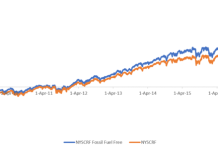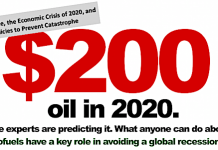Green Energy Investing for Experts, Part II
Tom Konrad, CFA
The next Tequila Crisis will be a peak oil crisis. Mexico’s government is dependant on revenues from declining oil fields. The prospects for replacing these revenues look slim. Shorting Mexico Country ETFs looks like a good way to hedge market exposure.
In Green Energy Investing For Experts, Part I, I discussed why it makes sense to use companies and sectors that may be hurt by peak oil or climate change as a hedge against the market exposure in a green portfolio. In Mexico, peak oil is already a reality. Production has already declined , but, because most investors do not understand the irreversible nature of declines in oil output, the Mexican stock market had not yet discounted the damage that peaking oil production is likely to do to the Mexican economy.
Below is a quote from the Oil Drum about Mexican oil production:
The President just changed the head of Petroleos Mexicanos (Pemex) as the revenues that the state gets from sale of its oil (making up nearly 40% of the federal budget) dropped 30% in the first half of the year. Current Mexican Government predictions that overall Mexican production will stabilize at 2.5 mbd over next year don’t reflect the collapse of Cantarell, and also fail to recognize that the promised increases in production from other fields are not reaching the goals set. It is only a few days since the production at Chicontepec was “evaluated” after falling some 12,000 bd short of target. This field is still in development, with ultimate production targeted at 550,000 to 700,000 bd by 2017, but as it is already 16% behind the mark that does not augur well for that future.
As Euan Mearns pointed out the fields at Ku-Maloob-Zaap (KMZ) which lie adjacent to Cantarell are being produced in the same way as Cantarell, and thus production has recently risen dramatically.
That means the Mexican Federal revenues dropped 12% in the first half of 2009 because of falling oil production. This is not a one-time hit to the budget, but part of an ongoing decline. That means that Mexican government revenues are permanently 12% lower, and likely to decline further as oil production declines further.
I can’t think of any good way to make up for the large and growing budget gap. Raising taxes would flatten an economy already hurting from the financial crisis. Cutting spending would do the same. Cutting funding to museums is painful but insufficient. Debt is currently at 44% of GNP, a high level, but possibly manageable if the decline in revenues were cyclical, rather than permanent and ongoing. With declining revenues, default and/or devaluation seems almost inevitable. No option would be good for Mexican companies.
Shorting Mexico
If the Mexican Governments’ fiscal situation is so dire, it makes sense to short Mexican companies, especially if the short is part of a hedge against exposure to world financial markets. With a hedge, the investor only needs to be confident that things are liable to get worse in Mexico more rapidly than elsewhere, or not get better as quickly.
That seems like a very good bet to me, so I looked for Mexican Country ETFs or closed-end funds to short. I found
- The Mexico Equity and Income fund (MXE)
- The Mexico Fund (MXF) and
- The iShares MSCI Mexico Index Fund (EWW)
The first two are closed-end funds with limited liquidity. The iShares ETF, however, is widely traded and liquid. It also has a good number of exchange traded options with decent liquidity, including long term LEAPS with maturities of over a year.
In terms of the hedging strategies I discussed in Part I, I prefer buying puts when I am anticipating a not-very-likely but potentially drastic event to affect the security. As I discussed above, in Mexico’s case we are dealing with a harmful event (declining oil revenues) that is already underway, and is likely to have harmful, if not disastrous effects.
Because the effects of declining oil production could be disastrous for Mexican stocks, I would prefer to short EWW, rather than selling an in-the-money call. An in-the-money call will cease producing gains once EWW has declined to its strike price; a short can be used to take advantage of declines all the way to zero.
To protect against unforeseen positive events, I usually combine such a short with a long dated out-of-the-money call, or with an in-the-money short call. In addition to liquidity, the availability of EWW LEAPS makes the ETF particularly attractive for this sort of hedging.
Unfortunately, as with many specialty ETFs, I found that shares of EWW were not available for shorting. Because of this lack, I chose to use a short call spread instead of a short position combined with a long call. This means that I will only be able to take advantage of large drops in the ETF by selling new with lower strike prices when the EWW share price falls below the strike price of my short call, which increases the cost of the overall transaction.
Conclusion
The profitability of this short position depends on either
- A general world stock market decline or
- The decline in Mexico’s oil revenues being more drastic than most investors are anticipating.
I personally expect both, but if I’m wrong about one, there’s a good chance the other will work in my favor. There’s always a chance I’m wrong about both, and that’s why I buy the calls. This series will continue with more short ideas that may benefit from peak oil or climate change regulation: Diversification makes a much sense on the short side as it does on the long side.
DISCLOSURE: Short EWW.
DISCL
AIMER: The information and trades provided here and in the comments are for informational purposes only and are not a solicitation to buy or sell any of these securities. Investing involves substantial risk and you should evaluate your own risk levels before you make any investment. Past results are not an indication of future performance. Please take the time to read the full disclaimer here.







In concept I agree with your thesis. Mexico is experiencing serious difficulties, and those difficulties seem likely to continue, if not worsen. In addition to oil revenue, Mexico’s other major sources of foreign currency are remittances from workers in the USA and tourism. Both are down substantially.
Having said that, lets reconsider the impact of “peak oil” on Mexico. Certainly Cantarell production is falling off a cliff. And, as you point out, the new oil fields are not coming on line to offset the production decline.
However, when evaluating the impact of the production decline on Mexican revenues, one must also consider the other element in the equation, the price of oil. In a peak oil scenario, it is reasonable to project that the price of oil will escalate, potentially dramatically. It is also reasonable to project a high degree of variability in those prices.
It seems unlikely that the price of oil will drop much below its present level, certainly not for an extended period. (Unless the world economy falls apart.) It also appears that oil consumption growth will resume next year while development of new production lags. If correct, the price of oil should rise.
An increase in the price of oil, say to $100/bbl, would have a dramatically beneficial effect on Mexico.
Further, a devaluation of the Peso, while seriously negative in the short term, could prove a longer term boon. Consider, for example, the impact on tourism.
Further still, there has been serious discussion about using the Mexican desert for solar thermal electricity generation to be exported to the USA. While this would not offset the lost oil production, it would be a significant new revenue source.
My point is that the decline in Mexican oil production does not, in itself, assure the decline of the Mexican economy. With proper management, and some luck, they could pull through.
I think that buying puts on the eww are potentially a good investment, but I wouldn’t make that play yet.
Mike,
You make some valid points that investors should consider, but there are also some details that you’re leaving out:
– Mexico’s net exports of oil are likely to fall much faster than its production, unless the Mexican economy falls apart.
– High oil prices are likely to hurt the world and US economy’s fragile recovery, which will send oil prices back down and/or disrupt the Mexican Economy.
– A cheaper peso will make the dollar value of Mexican stocks go down, so even if it helps the companies in the long term, it will hurt EWW in the short term.
That said, this is clearly a risky play. And I prefer it as a hedge to a stand-alone play.
Your optimistic scenarios for Mexico all seem to rest on a world economic recovery. Since I advocate this EWW short as part of a hedge against general stock market exposure, not as a stand-alone speculation that EWW will fall. Even if your optimistic scenarios work out, it will still be working as a hedge.